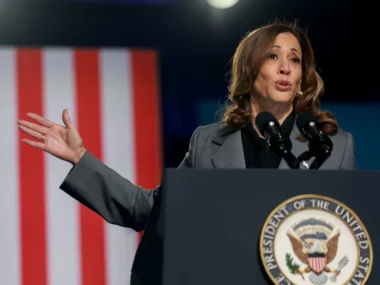The governor of China’s central bank has conveyed to several prominent Western companies that China will liberalize its financial industry and create a more favorable business environment for foreign enterprises. This move is part of Beijing’s ongoing efforts to attract overseas investment amidst growing economic challenges.
Pan Gongsheng, who serves as the head of the People’s Bank of China (PBOC) and oversees the country’s foreign exchange regulation, led a symposium attended by representatives from various foreign firms. These companies included JP Morgan, Tesla (TSLA), HSBC (HSBC), Deutsche Bank (DB), BNP Paribas, Japan’s MFUG Bank, German chemical producer BASF, commodities trader Trafigura, and Schneider Electric. The purpose of the symposium, as stated in official releases by the PBOC and the State Administration of Foreign Exchange (SAFE), was to enhance financial support for stabilizing foreign trade and investment and to enhance the investment climate for foreign businesses.
Foreign companies and investors have become increasingly cautious about the mounting risks in the world’s second-largest economy. These concerns include a deteriorating economic situation characterized by a slowdown marked by weak domestic demand and a housing crisis. Additionally, there is apprehension over Beijing’s prioritization of national security over economic growth and the deteriorating relationships between China and numerous Western nations.
Data released by China’s commerce ministry in the first eight months of this year indicates a 5.1% decline in foreign direct investment into China compared to the previous year. Another measure for foreign investment paints an even bleaker picture, as direct investment liabilities plummeted to a mere $4.9 billion in the April to June period, representing an 87% drop from the previous year. This figure was the lowest recorded in any quarter since data tracking began in 1998.
According to a business climate survey published by the American Chamber of Commerce in Shanghai on Tuesday, 40% of respondents are either currently redirecting or planning to redirect investments originally earmarked for China to other regions, primarily in Southeast Asia. This figure is an increase from the 34% of respondents from the previous year who had similar plans to redirect their investments.
Furthermore, the survey highlighted a decline in optimism among companies regarding the five-year business outlook. Only 52% of respondents expressed optimism, which is the lowest level recorded in the history of this survey, as reported by the chamber in a statement.
In the previous month, Gina Raimondo, the US Commerce Secretary, was quoted as saying, during her visit to China, that certain US companies had conveyed to her that China had become “uninvestable.”
In response, a spokesperson for the Chinese foreign ministry asserted that China continues to be one of the world’s significant investment destinations.
The companies that participated in the People’s Bank of China (PBOC) meeting called upon Beijing to enhance its business environment, as noted in the PBOC’s statement.
Pan Gongsheng, the governor of the People’s Bank of China (PBOC), assured the companies that they would persist in refining policy frameworks and establishing a business environment that is market-driven, legally sound, and on par with international standards.
He also mentioned that the regulators would work towards enhancing the financial services sector to facilitate the ongoing process of opening up the Chinese economy.











